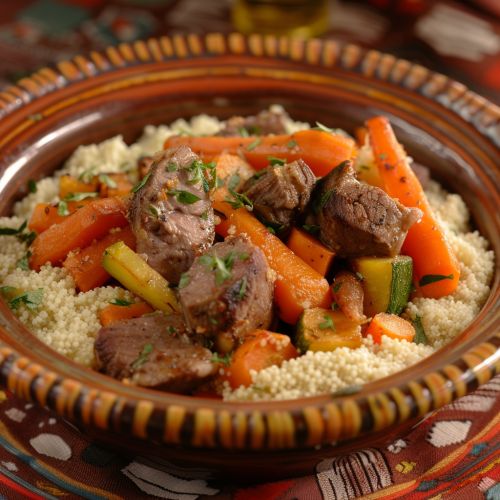Berber Cuisine: Difference between revisions
(Created page with "== Introduction == Berber cuisine is a traditional style of cooking that originates from the Berber ethnic group in North Africa. This culinary tradition is characterized by simple yet flavorful dishes, with a heavy reliance on locally sourced ingredients. The cuisine is primarily based on cereals, which are a staple food in the region, as well as a variety of vegetables, fruits, and meat. <div class='only_on_desktop image-preview'><div class='image-p...") |
No edit summary |
||
| Line 3: | Line 3: | ||
Berber cuisine is a traditional style of cooking that originates from the [[Berber people|Berber]] ethnic group in North Africa. This culinary tradition is characterized by simple yet flavorful dishes, with a heavy reliance on locally sourced ingredients. The cuisine is primarily based on cereals, which are a staple food in the region, as well as a variety of vegetables, fruits, and meat. | Berber cuisine is a traditional style of cooking that originates from the [[Berber people|Berber]] ethnic group in North Africa. This culinary tradition is characterized by simple yet flavorful dishes, with a heavy reliance on locally sourced ingredients. The cuisine is primarily based on cereals, which are a staple food in the region, as well as a variety of vegetables, fruits, and meat. | ||
[[Image:Detail-77915.jpg|thumb|center|A traditional Berber meal featuring couscous, vegetables, and meat.]] | |||
== History and Origins == | == History and Origins == | ||
Revision as of 10:43, 8 May 2024
Introduction
Berber cuisine is a traditional style of cooking that originates from the Berber ethnic group in North Africa. This culinary tradition is characterized by simple yet flavorful dishes, with a heavy reliance on locally sourced ingredients. The cuisine is primarily based on cereals, which are a staple food in the region, as well as a variety of vegetables, fruits, and meat.

History and Origins
The origins of Berber cuisine can be traced back to ancient times, with influences from various cultures due to the strategic location of the Berber lands. The Berbers, also known as the Amazigh, have a rich history that spans thousands of years, with their culinary traditions reflecting their nomadic lifestyle and the diverse environments in which they lived.
Key Ingredients
Berber cuisine is known for its use of a variety of ingredients, which are largely influenced by the region's climate and geography. Cereals such as barley and wheat are staples, used in dishes like couscous and different types of bread. Legumes, vegetables, and fruits are also commonly used, with olives, dates, and figs being particularly popular.
Meat, especially lamb and chicken, is used in many dishes, although it is often reserved for special occasions due to its cost. Fish is also consumed, particularly in coastal areas. Dairy products, such as milk and cheese, are also important components of the Berber diet.
Spices play a crucial role in Berber cuisine, with saffron, cumin, coriander, and cinnamon being commonly used. Herbs such as mint, parsley, and coriander are also frequently incorporated into dishes.
Traditional Dishes
One of the most iconic dishes in Berber cuisine is couscous, a dish made from small granules of durum wheat which are often served with a stew. Another popular dish is tajine, a slow-cooked stew that is named after the earthenware pot in which it is cooked. Other traditional dishes include rfissa (a dish made with chicken, lentils, and fenugreek), and b'stilla (a sweet and savory meat pie).
Cooking Techniques
Berber cuisine utilizes a variety of cooking techniques, from grilling and roasting to slow-cooking and steaming. The use of the tajine pot, for example, allows for slow-cooking over a low heat, resulting in tender, flavorful dishes. Steaming is also a common technique, particularly for cooking couscous.
Influence and Spread
Berber cuisine has had a significant influence on other culinary traditions, particularly those of the Middle East and Mediterranean. The use of spices and herbs, the emphasis on fresh, locally sourced ingredients, and the combination of sweet and savory flavors are all characteristics that have been adopted by these cuisines.
